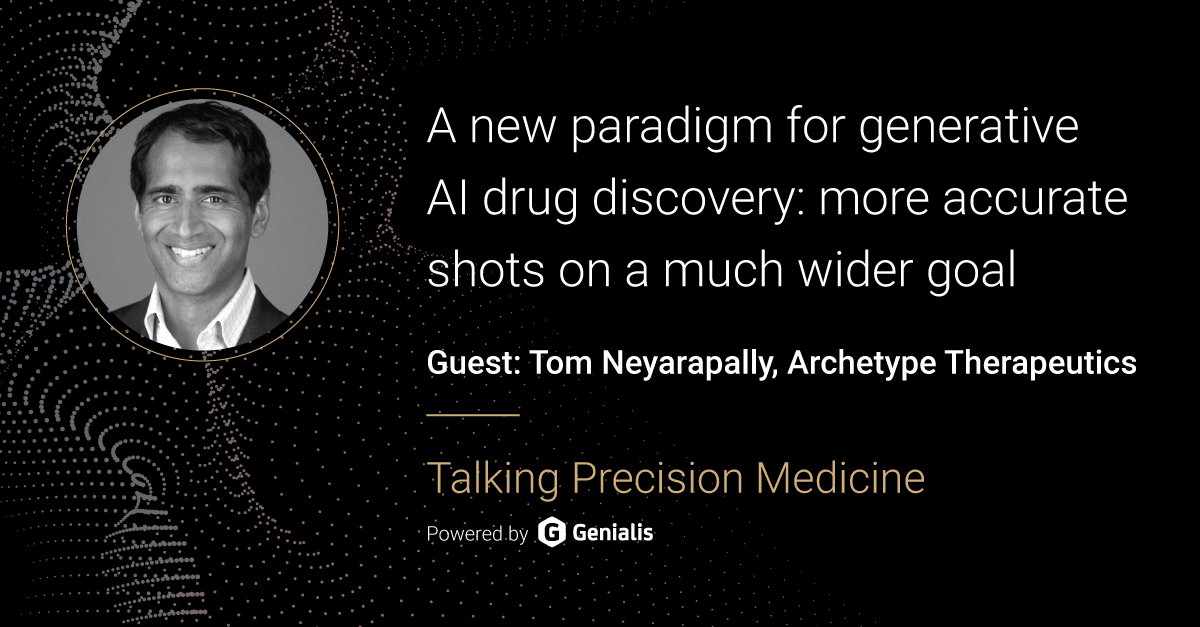Welcome to Talking Precision Medicine (TPM podcast) — the podcast in which we discuss the future of healthcare and health technology, and how advances in data and data science are fueling the next industrial revolution.
Joining us on this episode is Tom Neyarapally, co-founder and CEO of Archetype Therapeutics, an exciting new AI-driven company in the drug discovery space. Archetype is an AI-native biotech pioneering the use of generative chemogenomics and patient clinicogenomic data to virtually screen billions of potential drug candidates each day.
Come on in and have a listen.
Links:
- Archetype Therapeutics
- Tom Neyarapally on LinkedIn
- “Exploring a “Patient-First” Path in Drug Discovery”, a LinkedIn article by Tom Neyarapally, Paul McDonagh, and Rafael Rosengarten
Episode highlights:
Drug discovery starting with the patient
“Our whole premise is a patient-first approach to drug discovery in which we start with patient data, both clinical and genomic, and build patient-genomic classifiers.”
- Archetype uses clinical and genomic data to build patient classifiers, like those used in diagnostics, but repurposed for drug discovery.
- They apply generative AI to model the link between drug structure, disease biology, and clinical outcomes, enabling screening of billions of molecules in a day.
Designing drugs to perturb biology, not just hit a target
“The idea that biology is not just about one target, but that there are multiple pathways in play with respect to how the disease plays out is important. And by not focusing just on a target at the outset, we can cover that.”
- Archetype’s models don’t rely on fixed targets. Instead, they evaluate how drugs modulate biology and move gene expression in a direction associated with better outcomes.
- Their approach allows for complex, polypharmacy effects and expands the space of potentially effective drugs, especially when traditional target-based methods fall short.
Real-world validation
“The first time we ever submitted anything, we had a talk, not a poster at AACR. I’m not an expert in this, but I’ve been told that that’s actually a pretty big deal. So we were very proud of that.”
- Archetype correctly predicted clinical trial results for Pfizer’s talazoparib in prostate cancer, challenging conventional expectations around PARP inhibitors.
- They also collaborated with Mount Sinai on early-stage lung cancer, where their in silico-designed drug outperformed existing candidates in GEM mouse models.
A biotech built on past lessons and big ambition
“Is your mission to be a partner in a law firm, or is it to be a banker, or is your mission to solve problems for patients every day? If that’s what you’re really passionate about, I think it’s an incredibly exciting time. Despite the financial challenges and the unique macro environment we’re facing, the tools, the technology, the data, the people, and the passion are all still out there to get it done.”
- Tom’s journey spans early systems biology at GNS, commercial leadership at Sema4, and now building Archetype with co-founder Paul McDonagh.
- The future of precision medicine will be faster, more adaptive, and centered on real patient needs. Instead of chasing a universal cure, Archetype is working toward making cancer a manageable, chronic condition, with treatments that adjust as the disease evolves.
This has been Talking Precision Medicine. Please subscribe and share our podcast with your colleagues, leave a comment or review, and stay tuned for the next episode. Until then you can explore our TPM podcast archive and listen to interesting guests from our past conversations.




